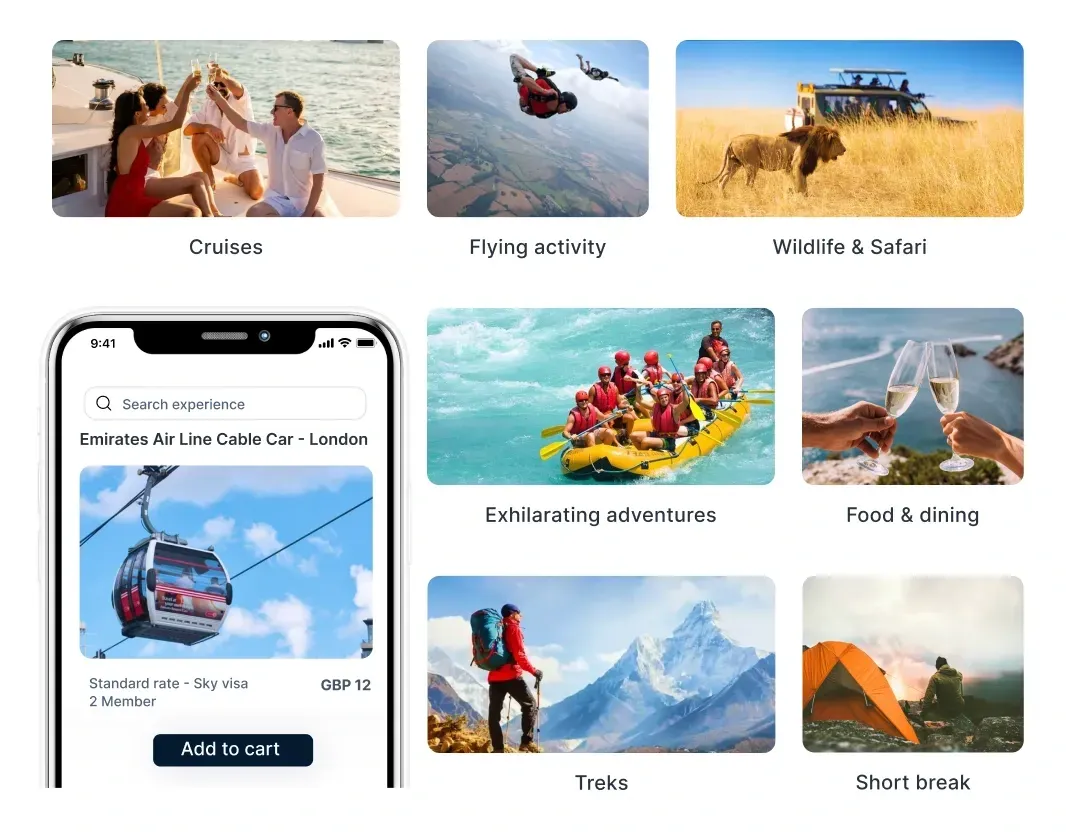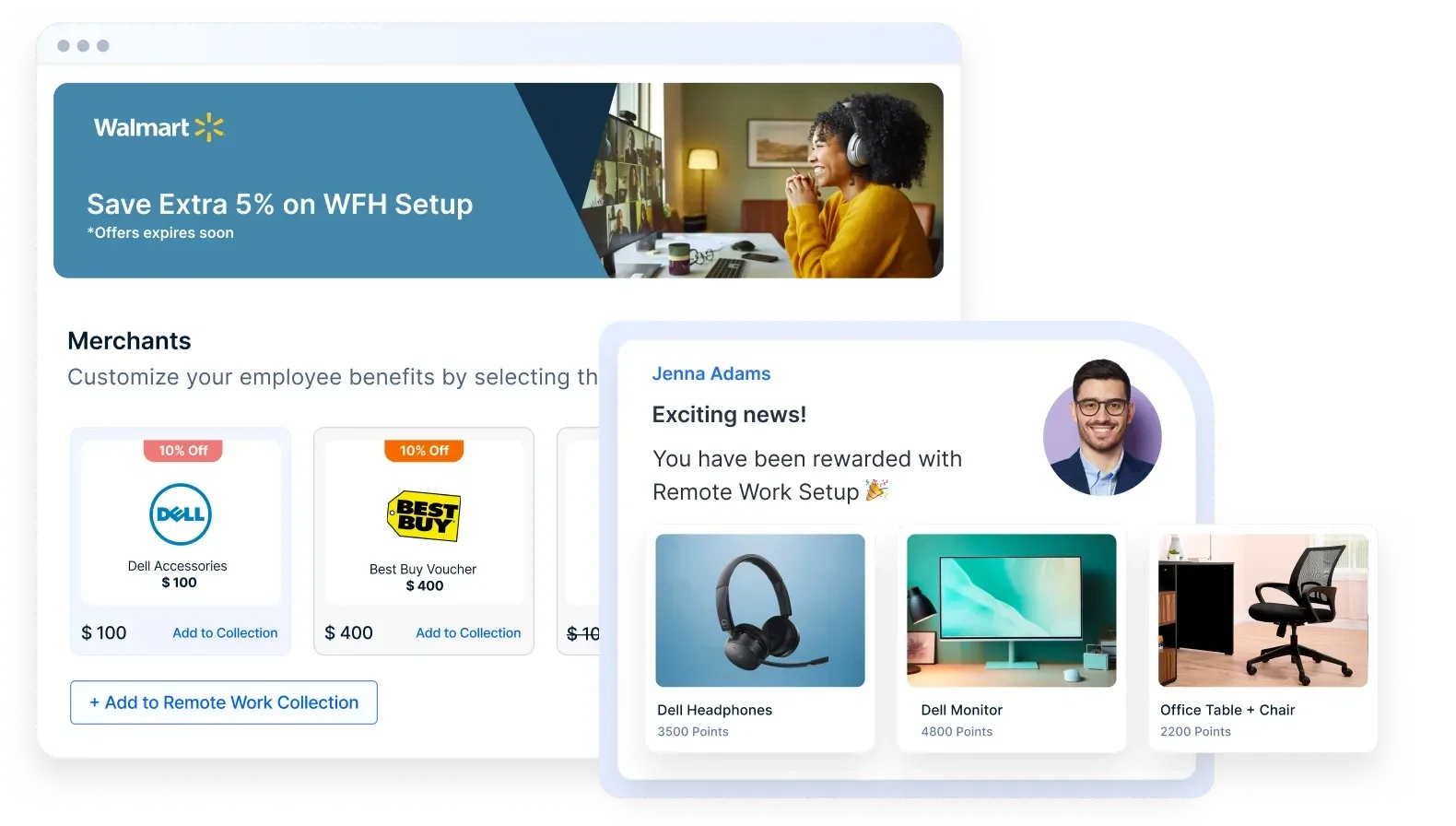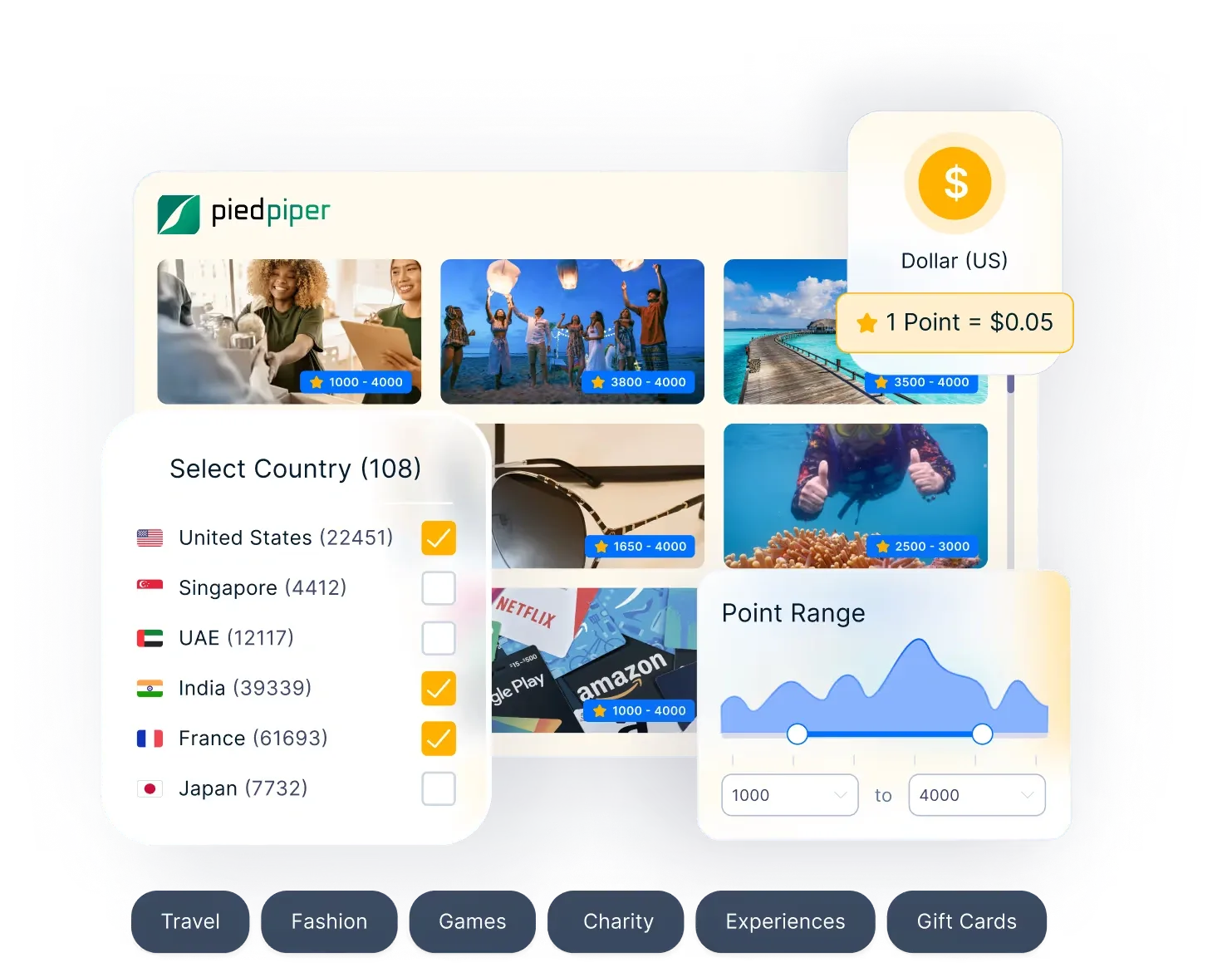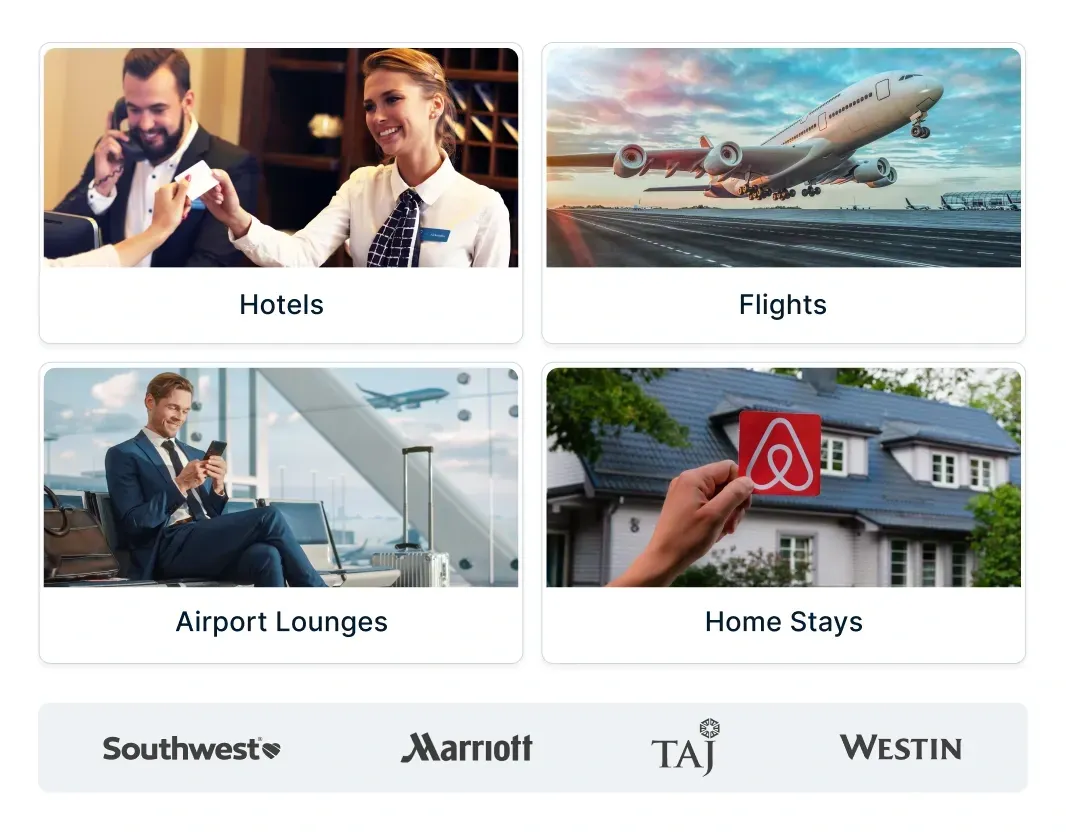Travel Benefits for Employees: A Modern Strategy to Boost Engagement, Retention, and Well-being
Looking to motivate and retain your team? Travel benefits for employees offer the perfect mix of rest, reward, and recognition. Learn how to implement them at scale.
On this page
- How employee travel enhances mental and physical health
- The link between travel, productivity, and problem-solving
- Why travel makes a meaningful employee benefit
- How to offer travel as an employee benefit?
- Tips for rolling out a travel benefit program
- Addressing inclusivity and accessibility
- How Empuls can power your travel benefit program
- Conclusion: Travel isn’t just a perk—it’s a people-first strategy
Gone are the days when bonuses and office snacks were enough to keep employees engaged. In a post-pandemic world where burnout is high and work-life boundaries are blurred, companies are challenged to rethink their approach to benefits.
One emerging trend leading the charge? Travel as an employee benefit.
Offering travel opportunities—whether through reward vouchers, paid sabbaticals, or wellness getaways—has evolved into a powerful strategy for improving employee mental health, motivation, and retention. It’s not just about giving time off; it's about creating meaningful experiences that employees associate with their personal growth and their workplace.
In this blog, we’ll explore why travel benefits work, how to implement them effectively, and how platforms like Empuls can help you turn this concept into a reality.
How employee travel enhances mental and physical health
Travel is widely recognized as a therapeutic escape that refreshes the body and mind. The positive health effects can be profound when employees step away from their routine and immerse themselves in new environments.

1. Reduces the risk of heart disease
According to The Yale Tribune, regular travel reduces the risk of cardiovascular issues such as heart attacks, angina, and strokes. This is partly due to the low-intensity physical activity involved—from walking through airports to exploring new cities—which helps improve circulation and heart health. Travel also naturally lowers stress, a key contributor to heart disease.
2. Boosts immunity
Travel exposes the body to new environments, germs, and bacteria, helping build a stronger immune system. While hygiene is still important, moderate exposure to new allergens can help develop a more robust defense mechanism against illnesses.
3. Improves brain function
Exposure to new languages, unfamiliar streets, and different cultures stimulates cognitive activity. Travel challenges the brain, improving concentration, memory, and even reducing the risk of degenerative diseases.
4. Enhances bone health
Spending more time outdoors—visiting beaches, architectural sites, or hiking in sunny climates—increases vitamin D absorption, which boosts calcium and phosphorus levels essential for bone strength.
5. Improves respiratory health
Escaping urban pollution for countryside or oceanic destinations gives the lungs a break from smog and irritants. Breathing in clean, salty air has been shown to ease respiratory issues and improve overall lung function.
6. Encourages weight management
Travel often involves walking, trekking, or adventure sports that engage the body. Even casual sightseeing increases physical activity, helping employees maintain a healthier lifestyle.
The link between travel, productivity, and problem-solving
While health benefits are reason enough to encourage travel, the positive effects extend deeply into the workplace. Time away from the office gives employees the mental space they need to reflect, recharge, and return with fresh perspectives—making them more effective and innovative on the job.
1. Recharges mental focus
Constant exposure to the same environment can dull concentration and lead to burnout. Travel, especially to natural settings, gives the brain a much-needed reset. The expansive landscapes, calming sounds, and fresh air work wonders on reducing mental fatigue and enhancing focus upon return.
2. Promotes perspective shifts
Routine can limit creative thinking. Travel breaks that routine and exposes employees to new people, cultures, and problem-solving scenarios. From navigating a foreign city to handling unexpected travel hiccups, these experiences strengthen adaptability and broaden mental frameworks—critical traits for workplace innovation.
3. Relieves accumulated stress
Prolonged work stress not only affects morale but also impairs decision-making and productivity. Taking time off allows employees to decompress, returning to work more emotionally balanced and better equipped to handle pressure.
4. Sparks creativity
New experiences trigger new ideas. Whether it’s seeing a different way of life or tasting unfamiliar cuisines, travel can inspire creative solutions to workplace challenges. Employees often return with enhanced curiosity, storytelling ability, and idea generation—all key to team collaboration and innovation.
5. Improves communication skills
Navigating unfamiliar environments, asking for directions, or interacting with people who speak different languages sharpens communication skills. These experiences improve empathy, listening, and clarity—skills that naturally enhance collaboration and teamwork.
6. Builds resilience and confidence
Unexpected challenges during travel—from language barriers to logistical issues—encourage employees to think on their feet. Overcoming these hurdles builds confidence and mental resilience, contributing to more decisive leadership and problem-solving at work.
Why travel makes a meaningful employee benefit
Travel is one of the most impactful benefits a company can offer in today’s workplace. Unlike traditional perks—such as gift cards or spot bonuses—travel creates emotional value, personal fulfillment, and long-lasting memories. It appeals to an employee’s desire for rest and their more profound need for purpose, discovery, and connection.
Here’s why offering travel as a benefit truly matters:
1. Reduces burnout and boosts retention
Extended periods of stress can lead to disengagement and high turnover. Travel offers a natural remedy—encouraging employees to unplug, recharge, and return with renewed energy. Employees who feel cared for are likelier to stay with their employer long-term.
2. Drives long-term motivation
When employees know there’s a meaningful reward on the horizon—like a weekend getaway or a fully paid cultural experience—they’re more motivated to meet goals, support teams, and exceed expectations.
3. Reinforce work-life balance
By encouraging time away from work, travel benefits signal that your company values employee well-being over constant hustle. This shift supports healthier habits and builds trust between employer and employee.
4. Builds loyalty and emotional connection
A travel experience becomes a story an employee tells their family, friends, and colleagues—creating a positive emotional association with your company brand. That emotional loyalty can’t be replicated by monetary perks alone.
5. Appeals to modern workforce expectations
Millennials and Gen Z prioritize experiences over material possessions. Travel aligns perfectly with their values, making your organization more attractive in a competitive talent market.
How to offer travel as an employee benefit?
Implementing travel as an employee benefit doesn’t have to be complicated. Whether you’re a startup or a large enterprise, there are scalable ways to introduce travel into your rewards strategy. The key is aligning it with your company’s culture, goals, and budget—while allowing employees to enjoy it on their own terms.
Here are a few practical approaches:
1. Travel vouchers as performance rewards
Recognize top performers, milestone achievers, or team contributors with personalized travel vouchers. These can range from domestic weekend getaways to international experiences, allowing employees to plan their dream break.
2. Experience-based gifting
Replace generic gifts with experience-based travel rewards. For example, instead of sending a festival gift box, give the option of a two-night nature retreat or a city escape voucher.

3. Company-sponsored retreats or offsites
Team retreats are a powerful way to blend team-building with wellness. Whether it’s a beach resort, a mountain escape, or a cultural destination, these trips strengthen collaboration and refresh minds.
4. Paid sabbaticals or travel stipends
Consider offering travel stipends or sabbaticals for long-tenured employees or those in high-stress roles. It’s a great way to reward loyalty and give employees time for deep rest or personal development.
5. Flexible paid time off policies
Encourage employees to use their PTO by pairing it with occasional travel bonuses or destination suggestions. A culture celebrating time off sets the stage for a healthier, more balanced workforce.

Tips for rolling out a travel benefit program
Now that you’re ready to offer travel as a benefit, the next step is making it easy to implement and enjoyable for your team. A well-structured travel program adds value and builds trust and excitement across the organization.
Here’s how to launch it successfully:
1. Set a clear budget
Decide how much you’re willing to invest per employee, per year, or per milestone. You can offer fixed-value travel vouchers or vary the reward based on performance, role, or tenure. Keep scalability in mind as the program grows.
2. Define eligibility and reward criteria
Establish who qualifies and under what conditions. Will the benefit be tied to work anniversaries, quarterly KPIs, or manager nominations? Clear guidelines help employees understand how they can earn the reward.
3. Partner with travel vendors or platforms
Collaborate with platforms like Empuls or trusted travel partners to provide diverse, high-quality options. These partnerships often offer bulk discounts and reduce admin work for your HR team.
4. Communicate with clarity and excitement
Launch the program with a splash! Use internal newsletters, presentations, or short videos to explain the benefits and generate buzz. Share stories or photos from early adopters to create interest.
5. Prioritize flexibility and personalization
One-size-fits-all doesn’t apply to travel. Offer flexible redemption timelines, different destination types, and experience options to meet varying employee preferences and lifestyles.
6. Collect feedback and refine
Ask employees what they loved—or didn’t—about their travel experience. Their insights can help you improve vendor selection, reward structure, and communication for future iterations.
Addressing inclusivity and accessibility
Travel may be exciting for many, but not all employees will have the same comfort level, ability, or interest in using travel-based benefits. To ensure your program is fair and inclusive, it’s essential to design with flexibility and empathy in mind.
Here’s how to make your travel benefit work for everyone:
1. Offer alternatives
Some employees may prefer not to travel for personal, cultural, or health reasons. Provide equivalent options such as wellness retreats, local experiences, or even monetary equivalents they can use as they see fit.
2. Cater to different life stages and needs
Ensure your travel rewards accommodate solo travelers, couples, and families. A parent might appreciate a child-friendly weekend retreat, while a younger employee may prefer an adrenaline-packed solo adventure.
3. Ensure accessibility
Choose travel vendors that offer accessible accommodations and transportation. Ask for options that support employees with mobility or dietary requirements, and make these details part of your internal communications.
4. Allow flexibility in timing
Not everyone can travel during peak seasons or on short notice. Offer long redemption windows so employees can plan trips at the best time for them.
5. Be mindful of remote or global teams
If you operate across regions or continents, ensure your travel benefit is not limited by geography. Offer regional voucher options or currency equivalents that provide equal value to international teams.
How Empuls can power your travel benefit program
While offering travel as a benefit sounds inspiring, executing it seamlessly can be challenging—especially at scale. That’s where Empuls steps in. With its robust reward and recognition platform, Empuls makes it easy to launch, manage, and personalize travel benefits that resonate with your workforce.

Here’s how Empuls helps simplify and elevate your travel benefit program:
1. Curated global travel options
Empuls partners with a wide range of travel providers, offering employees access to flights, hotel stays, local experiences, cruises, retreats, and more—all in one platform.

2. Personalized and flexible reward experiences
You can tailor travel rewards based on employee preferences, tenure, performance, or wellness milestones. Employees can choose where, when, and how they want to travel.
3. Easy-to-manage reward distribution
HR teams and managers can send travel vouchers instantly, with built-in tracking, approval flows, and budget controls. Whether you’re rewarding one employee or an entire department, Empuls makes the process effortless.
4. Powerful analytics for more brilliant decisions
Track redemption rates, measure engagement, and gather insights on what travel rewards employees prefer. Use these insights to optimize your future recognition strategy.

5. Scalable across teams and geographies
Empuls is built for modern workforces—remote, hybrid, or global. You can run a single travel rewards program across all offices to ensure employees feel equally valued.
With Empuls, you can offer tailored, flexible, and scalable travel rewards that fit seamlessly into your culture and goals. Empower your team to rest, explore, and return inspired.
👉 Book a demo today or start your free trial with Empuls. Let meaningful experiences shape your workplace culture.
Conclusion: Travel isn’t just a perk—it’s a people-first strategy
Companies must go beyond the conventional to stand out in a world where workplace expectations are evolving rapidly. As an employee benefit, travel offers more than just relaxation—it promotes wellness, fuels creativity, strengthens retention, and reinforces a culture of genuine appreciation.
By giving your employees the gift of new experiences, you show that you value them as individuals, not just job titles. Whether it’s a quick weekend retreat, a long-awaited sabbatical, or a curated adventure, travel can transform how employees feel about your organization—and themselves.


















